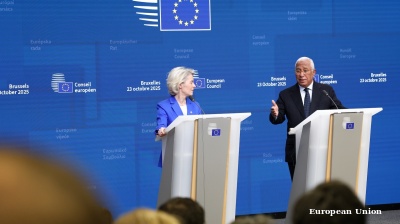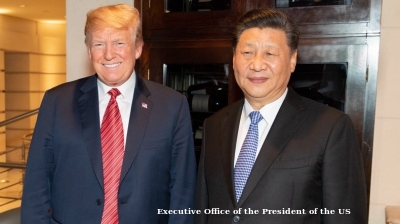‘Island of democracy’ Kyrgyzstan seen as succumbing to rise of Japarov’s nationalist populist regime

Kyrgyzstan, famously sometimes dubbed the only “island of democracy” in Central Asia, is succumbing to the rise of the nationalist and populist regime of Sadyr Japarov, according to Advox, a Global Voices Online project that researches “digital authoritarianism”.
In an excerpt from its “Unfreedom Monitor Report” on the phenomenon in Kyrgyzstan, Advox says: “Since the adoption of the Law on Protection from False Information (aka the law against the spread of fake news) in Kyrgyzstan in August 2021, the legal persecution and detention of critics and bloggers because of their posts on social media has become possible.
“The number of Facebook or other social media users censored and interrogated by the Kyrgyz security services for their criticism towards the president and the incumbent government is skyrocketing.”
Separately, Human Rights Watch (HRW) on June 9 called on the Kyrgyz parliament to reject “a highly repressive” draft law that would interfere with the activities of nongovernmental organisations.
The legislation, accused by critics of aping an illiberal and oppressive law operated by the Putin regime in Russia, would require NGOs to register with the justice ministry as “foreign representatives” if they receive funding from abroad and engage in political activity.
“Failure to register under the law could result in suspension of the organization’s activities, including its banking operations, for up to 6 months or until it is registered. This requirement is clearly intended to discredit and stigmatize groups that receive foreign funding and could have a chilling effect on the country’s civil society at a time when it is already under attack,” New York-based HRW said.
“The draft law is incompatible with international human rights obligations, restricting freedom of association and expression, as well as introducing in some cases criminal liability for nongovernmental organizations and their staff members,” said Syinat Sultanalieva, Central Asia researcher at HRW. “The draft law poses a serious threat to Kyrgyzstan’s vibrant civil society and should be withdrawn,” she added.
Advox’s report also referred to how seven bloggers, including bloggers related to media channels critical of the state, were censored and interrogated by the Kyrgyz security services in the period between January and June 2022.
“More than 30 critics of the regime — civil society activists, opposition politicians, independent journalists, bloggers and human rights activists — were detained between October and December 2022 for their social media criticism (mainly on Facebook) of the government’s decision to transfer the Kempir-Abad water reservoir to Uzbekistan in a border deal,” noted Advox, adding: “The detainees were accused of an attempt to overthrow the government after the security services released audio recordings of conversations between opposition politicians and civil society activists.
“Very soon [after], the authorities also shut down the website of Radio Free Europe [RFE/RL] affiliate Azattyk in Kyrgyzstan for two months for ‘biased
reporting’; in December 2022 the term was extended indefinitely.”
Prominent investigative journalist Bolot Temirov was expelled from Kyrgyzstan to Russia by a judicial decision in November 2022, added Advox.
In January, the Apparatus of the President of the Kyrgyz Republic released a draft Law on Mass Media, according to which the state will oversee bloggers, internet outlets and social media accounts with more than 5,000 followers. “The state intends to register them in a unified system in order to track and to monitor their activity,” said Advox.
Unlike previous presidents, Japarov, who was busted out of prison by supporters during Kyrgyzstan’s October 2020 revolution, is highly attuned to the influence of social media and is known to actively engage with it, Advox said.
He informally runs multiple fan or support pages/groups on popular social media channels Instagram, Facebook, Telegram, YouTube and WhatsApp, it added, saying: “Though these pages/groups might look harmless, they are heavily misused in order to increase authoritarianism and illiberal practices in the country (as documented in the public Airtable).
“Pro-president social networks misinform, disinform and manipulate information, create artificial support for the president and legitimise the authorities’ attacks on non-state media, civil society, bloggers and social media users. In other words, Kyrgyz authorities are worried about too much ‘digital freedom’ on the internet and thought of legislative measures to limit it.”
Social media groups supportive of Japarov “have emerged with the aim of garnering backing for the president during critical moments, and are run by individuals associated with his informal network, while receiving funding from unknown pro-president groups or individuals”, said Advox.
“The support pages promote the current regime’s decisions and policies by creating proregime content (usually videos) that is disseminated through multiple social media platforms, while also commenting on contentious news items published by critical media channels. These videos are directed towards under-educated Kyrgyz-speaking people who tend to trust unverified sources, conveying unconfirmed and intentionally exaggerated information,” it added.
News
_1761305900.jpg)
Latin America edges up growth forecasts but remains trapped in low gear, ECLAC says
Latin America and the Caribbean will expand 2.4% this year, the Economic Commission for Latin America and the Caribbean said, marking the second upward revision since April but pointing to the region's struggle to escape chronically weak growth.

Palestinian ambassador pledges Iraqi embassy in Jerusalem
Palestinian ambassador pledges to open Iraqi embassy in Jerusalem as Iraq lays foundation stone for Palestinian ambassador's residence in Baghdad's new diplomatic quarter covering 300 hectares.

EU pledges ongoing support for Ukraine, defers decision on Russian assets
European Union leaders pledged continued financial backing for Ukraine over the next two years, but delayed a decision on tapping billions of euros in frozen Russian assets to fund Kyiv’s defence

Trump Administration striving to strike critical minerals deal with Kazakhstan
Pushing for US firm to win rights to develop major tungsten deposits.



